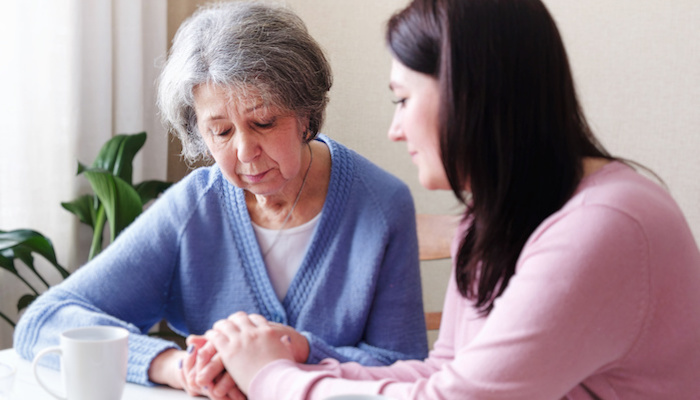The Heartbeat
Our monthly newsletter
June/July 2015
In this issue we share advice from the Mayo Clinic about learning to alter, and when appropriate, avoid life’s stressors. We also help you reduce the chance that your loved one will be rehospitalized. And last, in honor of National Cancer Survivors Day (June 7), we offer tips for those first few weeks after a cancer diagnosis.
Addressing your stressors
When times are hard, many of us grit our teeth and keep plugging away. While such commitment can be admirable, it can also lead to resentment and burnout.
Instead of just toughing it out, think about ways to “work smarter.” There may be opportunities to change how you approach situations that could directly reduce your load. The Mayo Clinic suggests looking for ways to “alter or avoid” stressors.
- Speak up. Others may do things in ways that irritate or disappoint you. Let them know your preferences. Use “I” statements so it is clear that you are not criticizing. “I worry that if pill bottles are in sight, Dad will take an extra dose. Let’s keep them in the cabinet.”
- Protect your time. Make a plan and aim for efficiency: Instead of dealing with mail daily, pay bills once a week. Group errands so that you’re not driving all over town every day. When you are running short on time, let others know (“I have only 10 minutes”) and bring things to a close when time is up.
- Respect your limits. You honestly can’t do everything. Nor can everything always go smoothly. “No” is not a bad word. It simply tells others where you stand. Remove from your to-do list the things that aren’t essential (even if you believe you “should” do them).
- Prioritize the positive. You need to replenish your personal well. Avoid topics or people who do not contribute to your well-being. Instead, spend quality time with the people who matter and who renew your spirit.
- Cultivate flexibility. It’s fine to ask others to alter their behavior. By the same token, you can reduce your own stress level if you look for ways to reinterpret their actions. Blessed are the flexible, for they do not get bent out of shape!
The post-discharge appointment
Newly discharged patients are fragile and need special attention. As many as 20% end up back in the hospital within a month. A follow-up visit with the doctor can greatly reduce the chance of a relapse.
Start connecting with your relative’s doctor before leaving the hospital.
- Get the hospitalist involved. Ask the hospitalist to contact and update the primary care provider.
- Schedule an appointment for the first week. Contact your relative’s doctor and explain that your loved one has been hospitalized. Describe the diagnosis and any new medications to discuss. If you are not given a date within a week of discharge, ask to speak to a supervisor.
- Assert yourself as necessary. Leave a voice or email message directly for the doctor if your appeal to the staff did not yield a timely appointment.
- Get copies of hospital records. You will want to bring lab results, x-rays, and the discharge summary to the doctor’s appointment. Get copies before you leave the hospital.
Make sure that your relative has transportation and any assistance needed to get to the appointment.
If you plan the appointment ahead of time, you can accomplish a lot. Prepare to discuss
- what led to the hospitalization. Review the symptoms and events that occurred before the crisis. Perhaps it’s time to see a specialist.
- what you understood happened in the hospital. Review any tests, x-rays, or consultations so you and the doctor can decide the next steps.
- medication changes. Compare the hospital discharge list with the doctor’s running list and discuss revisions.
- “red flags” to look out for. Make sure you understand meaningful changes or symptoms. Make a plan for what to do if they occur, especially outside normal office hours.
When there is a cancer diagnosis
If your loved one recently received a diagnosis of cancer, you both may be feeling stunned, anxious, and overwhelmed. Here are tips to help:
Lay a foundation for the journey to come.
- Acknowledge emotions. Anger, sadness, and confusion are among the many normal responses. And, of course, fear. Encourage your relative to talk about these feelings. Listen openly. Consider suggesting a support group with others who have had a cancer diagnosis.
- Reassure them that you are in their corner. All cancer patients are advised to have a fact-gathering friend at medical appointments. Let your relative know if you can do this, or help find a trusted alternate.
- Ask how much detail is desired. Your loved one may want to know everything. Or may prefer to not know and defer to someone else for decisions. Let the medical team know their preference.
Take the first key steps.
- Get exact information. Ask the doctor what kind of cancer it is, its size, stage, and usual growth pattern. Learning will help restore a sense of control in this overwhelming situation.
- Find the right doctor. You want a sense of teamwork with a doctor who listens and explains in words you and your relative understand. If this isn’t the case, switch.
- Learn treatment options. Get details about side effects and usual outcomes of potential treatments. Whether the desired results are likely or unlikely may determine the course of action.
- Consider a second opinion. Meet with a doctor specializing in your relative’s type of cancer.
- Be careful with the Internet. There is a lot of false information online. Only visit websites of credible organizations, such as the National Cancer Institute and the American Cancer Society.
Encourage your loved one to stay connected with friends and engage in enjoyable physical activities and pastimes that bring them meaning. A sense of normalcy and purpose can provide balance during this rocky time. Also ask that they accept help with routine tasks, such as cleaning and cooking. Similarly, for yourself, be sure to accept help so you can pace yourself and go the distance as a caregiver!
Return to top

